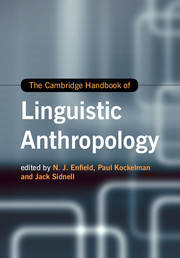Book contents
- The Cambridge Handbook of Linguistic Anthropology
- Series page
- The Cambridge Handbook of Linguistic Anthropology
- Copyright page
- Dedication
- Contents
- Figures
- Tables
- Contributors
- 1 Introduction
- Part I System and function
- Part II Process and formation
- Part III Interaction and intersubjectivity
- 14 Intentionality and language
- 15 The architecture of intersubjectivity revisited
- 16 Language and human sociality
- 17 The ontology of action, in interaction
- 18 Conversation across cultures
- Part IV Community and social life
- Part V Interdisciplinary perspectives
- Index
18 - Conversation across cultures
from Part III - Interaction and intersubjectivity
Published online by Cambridge University Press: 05 October 2014
- The Cambridge Handbook of Linguistic Anthropology
- Series page
- The Cambridge Handbook of Linguistic Anthropology
- Copyright page
- Dedication
- Contents
- Figures
- Tables
- Contributors
- 1 Introduction
- Part I System and function
- Part II Process and formation
- Part III Interaction and intersubjectivity
- 14 Intentionality and language
- 15 The architecture of intersubjectivity revisited
- 16 Language and human sociality
- 17 The ontology of action, in interaction
- 18 Conversation across cultures
- Part IV Community and social life
- Part V Interdisciplinary perspectives
- Index
Summary
Keywords
- Type
- Chapter
- Information
- The Cambridge Handbook of Linguistic Anthropology , pp. 447 - 480Publisher: Cambridge University PressPrint publication year: 2014
- 29
- Cited by

